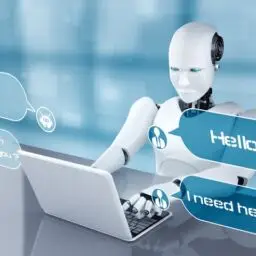
The fact is that some AI technologies have been part of our daily lives for many years, contrary to what some people might think. It is actually affecting our decisions and lifestyles in many ways, even ones we may not realize. This article reveals 22 interesting ways artificial intelligence is integrated into our daily lives and activities.
Face Recognition: Secure and Convenient Authentication
Face recognition is a prime example of AI’s impact on our daily lives. Many smartphone users rely on this technology for secure and convenient device authentication. It offers a user-friendly alternative to traditional passcodes and patterns, particularly useful when you’re in a hurry.
AI-based facial recognition technology employs various biometric measurements to identify individuals. By studying and storing facial coordinates, machine learning algorithms enable devices to recognize users accurately. This technology enhances security while simplifying user authentication, is yet another compelling example of AI in our daily lives. Unlocking our smartphones has evolved into a sophisticated process thanks to AI.
Take Apple’s Face ID, for instance. It captures precise facial data by projecting and analyzing thousands of invisible dots to create a detailed 3D map of your face. An infrared image further enhances accuracy. While hardware components are involved, AI plays a crucial role in enabling 3D facial recognition. The technology’s ability to perceive depth and analyze facial features in real-time is made possible by AI algorithms.
Smart Cars: Pioneering Safe and Autonomous Driving
The dream of safe and autonomous driving has become a reality, thanks to AI. Companies like Tesla have taken significant steps towards self-driving cars. In the United States alone, over 500,000 Tesla vehicles equipped with autonomous capabilities are on the road, with that number expected to increase every year.
AI’s machine learning capabilities power self-driving cars, enabling them to navigate, stop at traffic signals, handle complex road conditions, and prioritize safety. These vehicles can detect obstacles, adjust speed, and even adhere to speed limits, showcasing AI’s transformative role in the automotive industry.
AI’s influence on transportation is undeniable, especially in the realm of autonomous vehicle companies have leveraged AI to develop semi-autonomous and fully autonomous cars. These AI-driven vehicles continuously learn from real-world data, improving their driving capabilities over time.
What’s particularly noteworthy is that Tesla’s entire fleet of cars is interconnected, sharing the knowledge and insights gained from individual vehicles. This collaborative learning approach ensures that all Tesla cars benefit from the experiences of their peers, making autonomous driving safer and more reliable.
The impact of AI on our daily commutes is undeniable. AI is not limited to the roads; it extends to the skies with autonomous drones gradually becoming a part of our daily lives.
Digital Assistants: Your AI-Powered Personal Helpers
Digital assistants have revolutionized the way we manage tasks and control our surroundings. They respond to voice commands, making various activities more convenient. Whether you want to play music, adjust your home’s temperature, or check the weather, digital assistants have you covered.
Leading examples of digital assistants include Amazon’s Alexa and Apple’s Siri. AI-powered virtual assistants can understand and carry out tasks, answer questions, schedule appointments, make phone calls, send emails, set alarms, and improve user interactions based on preferences and search history.
Social Media Apps: Personalized User Experiences
Social media platforms like Twitter, Facebook, Instagram, and Snapchat, among others, are deeply influenced by AI. Whether you’re an active social media user or not, AI plays a significant role in shaping the content you encounter. Complex algorithms analyze your past behaviors, web searches, interactions, video views, and more to tailor your experience on these platforms.
AI’s primary objective in social media is to make the apps as addictive as possible, ensuring you return repeatedly. As AI continues to refine its algorithms, it’s winning the battle for our attention on social media.
AI-driven personalization isn’t limited to social networks. E-commerce giant Amazon employs AI to recommend products based on your browsing history and purchase history, increasing the likelihood of purchases. Similarly, dating Apps like Match, Tinder, and Bumble employ AI to curate recommendations for potential dates tailored to your preferences, keeping you engaged and connected for ideal mates.
Banking: Streamlining Financial Services
The banking sector has embraced AI, enabling digital banking processes that eliminate the need for physical presence. AI-driven chatbots facilitate seamless, 24/7 customer interactions, from account opening to e-payments. They enhance customer experiences while assisting middle-office functions like fraud detection, anti-money laundering (AML) checks, and Know Your Customer (KYC) compliance.
AI-powered solutions minimize risks, ensuring smoother banking experiences for both customers and institutions. These advancements have digitized banking services, making them more accessible and efficient.
Google Predictive Search Algorithm: Enhanced Search Experience
Google’s predictive search algorithm enhances search efficiency by offering suggestions as you type. This autocomplete feature predicts search terms character by character, providing relevant results before you finish your query. AI, machine learning, and deep learning power these prediction algorithms, making searches more effective and user-friendly.
Microsoft Bing: Revolutionizing Search with AI
Google has long been the dominant force in the world of search engines however, Microsoft’s Bing has undergone a transformation, leveraging the power of artificial intelligence. The new AI-driven Bing not only delivers more nuanced search results but also introduces a Chat mode.
Bing AI’s Chat mode allows users to engage in conversations with the search engine, opening up a realm of possibilities akin to ChatGPT. It can answer a diverse array of questions and execute numerous tasks. Since its introduction, MS Bing has surged in popularity, amassing over 10s of millions daily active users. If you’re already using MS Bing AI, you’ve experienced firsthand the capabilities of this compelling example of artificial intelligence.
And Google has launched Bard, the search giant’s answer to both OpenAI’s ChatGPT and Microsoft’s Bing Chat. Unlike Bing Chat, Bard does not look up search results, all the information it returns is generated by the model itself. But it is still designed to help users brainstorm and answer queries. Also Google is also reportedly working on Magi, a new AI-powered search engine. Magi is separate from Bard, but it may borrow from Google’s ChatGPT competitor.
Also there is Google Search Generative Experience (SGE) AI which is a new way to search with generative AI. It uses large language models to generate summaries of search results, answer questions in a comprehensive and informative way, and even generate creative text formats like poems, code, scripts, musical pieces, email, letters, etc.
SGE AI is still under development, but it has the potential to revolutionize the way we search for information. For example, instead of just giving you a list of links to search results, SGE AI can provide you with a high-level overview of the topic, including key points, different perspectives, and links to relevant articles. It can also answer your questions in a more comprehensive and informative way, even if they are open ended, challenging, or strange.
SGE AI is currently available in the US (English-only at launch) as a beta feature in Search Labs.
E-commerce: Personalized Shopping Experiences
Online shopping platforms rely on AI algorithms to enhance user experiences. These algorithms efficiently categorize and recommend products to buy based on keywords and filters. For instance, if you search for “white shoes,” the platform displays a collection of white shoes in various styles, brands, and price ranges. You can further filter results by price or pattern. In other words, AI-driven algorithms streamline product searches, making online shopping convenient and efficient. This personalization ensures that users find products tailored to their preferences quickly.
Chatbots: Enhancing Human Interaction with AI
In today’s digital landscape, we are all familiar with the concept of chatbots. Whether it’s a simple customer service bot or one that mimics human conversation, chatbots have become ubiquitous. However, what many may not realize is that a significant portion of these chatbots is powered by artificial intelligence.
Take, for instance, ChatGPT, an AI-powered chatbot developed by OpenAI. Initially used as a casual online companion, ChatGPT has evolved into a powerful AI-driven conversationalist. ChatGPT can perform a wide range of tasks that extend far beyond casual chitchat. It can write blog posts, generate complex code, craft compelling stories, provide recipes, and answer nearly any question you throw at it. In fact, ChatGPT is gearing up to access the internet through OpenAI’s forthcoming plugins, making it even more versatile.
So, the next time you engage with ChatGPT or its counterparts, remember that you are interacting with one of the most advanced examples of artificial intelligence.
Google Duplex and Hold For Me: AI for Everyday Tasks
Google Duplex represents another remarkable AI service that harnesses the full potential of artificial intelligence. First showcased in 2018, Google Duplex showcased its ability to make restaurant reservations on your behalf, using a human-like voice and context-aware responses. Today, it can assist in booking movie tickets, salon appointments, and more, albeit limited to the United States and English language for now.
Hold For Me, another AI-powered feature, has been introduced to Pixel phones in the U.S. It simplifies the experience of waiting on hold during phone calls by letting Google Assistant handle the call and notifying you when a human operator is available. This feature not only saves time but also reduces the frustration of navigating automated phone systems.
Smart Compose, Quick Reply, and Grammar Check: AI in Communication
For users of Gmail, the Smart Compose feature is a familiar AI-powered companion. It intelligently suggests complete sentences based on the context of your email, streamlining the drafting process and ensuring grammatical accuracy. It’s a time-saving feature that exemplifies how AI enhances our daily communication.
Quick Reply, available in both Gmail and various messaging apps on Android, is another AI-driven convenience. It analyzes incoming messages and offers contextually relevant quick replies, enabling rapid responses in our fast-paced digital conversations.
Furthermore, Google Docs incorporates an AI-powered Grammar Check feature. This tool helps writers maintain error-free sentences and can be easily enabled from the “Tools” menu. Beyond Google, there are alternatives like Grammarly that provide AI-driven grammar checks, further exemplifying how AI supports effective written communication.
Google Recorder, Live Captions, and Transcribe: AI in Speech Processing
AI’s influence extends deeply into speech detection and processing. Google Recorder and Otter.ai are prime examples of AI-powered tools that transcribe spoken words in real-time. Google Recorder even operates offline, offering precise transcriptions and creating searchable notes for easy editing.
Live Caption, available on Android and Chrome browsers, provides real-time captions for internal audio, thanks to AI. This feature significantly benefits those who are deaf or hard of hearing, enhancing accessibility.
Google’s Live Transcribe app, capable of transcribing speeches in over 80 languages in real time, goes a step further. It can detect surrounding sounds such as fire alarms, offering critical safety information to users.
Google Lens and OCR: AI in Visual Recognition
Google Lens is a versatile AI service that excels in optical recognition. It enables users to search for information by simply pointing their camera at objects, text, animals, or plants. Leveraging AI’s advancements in optical recognition, Google Lens swiftly provides accurate information about the subject.
Furthermore, Google Lens offers OCR (Optical Character Recognition) capabilities, allowing users to extract text from images with ease. Many OCR software libraries, including Tesseract and TensorFlow, are built on AI technology. This AI-driven functionality is found in apps like Adobe Scan and Microsoft Office Lens, where it aids in smart cropping and precise character recognition.
Fall Detection and Car Crash Detection: AI-Powered Safety
Modern technology has harnessed AI to enhance safety in various scenarios. Some newer Apple Watches incorporate Fall Detection, which automatically alerts emergency services when it detects a significant fall. AI algorithms, using data from accelerometers and gyroscopes, accurately identify such incidents, potentially saving lives.
Similarly, Google and Apple iPhones now feature Car Crash Detection, which relies on machine learning models trained on real-life car crash data. In the event of a collision, these AI-powered systems notify designated contacts and emergency response teams, expediting assistance. From software utilities to life-saving features, AI’s role in our daily safety is increasingly evident.
Google Assistant and AI in Photography
AI has been quietly revolutionizing smartphone experiences for years, and it’s an integral part of your daily interactions. Whether you’re using Google Assistant, Siri, Alexa, or Bixby, you’re engaging with AI-powered smart assistants. But AI’s influence goes further, even into the realm of photography.
Consider features like portrait mode, which enhances smartphone photography by artfully blurring backgrounds, making subjects stand out. The secret behind these striking portrait shots lies in artificial intelligence. Brands like Google and Apple have embedded AI capabilities into their smartphone cameras, delivering stunning results.
AI’s integration into smartphones doesn’t stop there. Manufacturers like Qualcomm and Huawei produce chips with built-in AI capabilities, enabling features such as scene detection and mixed and virtual reality elements. The emphasis on AI in recent Android and iOS updates signals its growing significance in shaping the smartphone experience.
AI Image Generators: Fostering Creative Expression
AI has democratized all kind of image creations. You can now generate intricate and imaginative images with AI-powered image generators. These tools require prompts, relying on your creativity to guide the artistic process.
A standout example is Midjourney, an AI image generator known for producing vivid and visually stunning images. These AI-generated artworks rival, and sometimes surpass, those created by human artists. The potential for AI to reshape the creative industry is evident, with an array of AI art generators available for experimentation.
Music and Media Streaming Services: AI-Enhanced Entertainment
Music and media streaming services like Spotify, YouTube, and Netflix have been transformed by AI, shaping our entertainment choices. Whether you’re enjoying your favorite tunes or binging on the latest shows, AI is subtly guiding your decisions.
Spotify, for instance, utilizes AI and machine learning to curate personalized playlists. Discover Weekly, a popular feature, introduces new artists and songs based on your listening habits. Additionally, AI-driven features like Enhance further tailor your playlists by adding songs with a similar vibe.
YouTube’s recommendation engine, powered by AI, assesses your data and behavior to offer video suggestions that align with your interests. Similarly, Netflix employs AI to suggest movies and shows that cater to your tastes, creating an engaging and customized viewing experience.
Video Games: AI as Interactive Opponents
Video games have been a testing ground for AI for quite some time. From generating random game levels to creating dynamic and responsive gameplay experiences, AI has a profound impact on gaming.
On a grand scale, OpenAI’s OpenAI Five achieved a momentous milestone by defeating professional Dota 2 players. Dota 2, a strategy-based game demanding split-second decisions, presented an ideal challenge for AI. This achievement marked a significant leap forward in the AI industry’s capabilities.
However, AI’s influence in gaming extends beyond competitive scenarios. In popular titles like PUBG and Fortnite, players initially encounter AI-powered bots before engaging with real human opponents. Even single-player games incorporate AI elements, with AI-controlled bosses providing challenging gameplay experiences.
One of the most intriguing uses of AI in gaming can be found in the Middle Earth series, where AI-controlled enemies evolve based on their interactions with players and the game world.
Navigation and Travel: AI-Powered Journeys
The navigation and travel industry is another domain where AI significantly impacts our daily lives. Whether it’s our daily commutes or long-distance journeys, AI plays a pivotal role.
Navigation apps like Google Maps and ride-sharing services like Uber rely on AI to provide real-time traffic data, optimize routes, and match users with drivers efficiently. The familiar voice guiding you through turns and traffic updates is a testament to AI’s contribution to safe and efficient travel.
When you request an Uber, AI determines the pricing and selects the vehicle that aligns with your ride request, ensuring convenience and cost-efficiency. Even when you book a flight ticket online, AI algorithms aid in optimizing your choices and offering the most suitable options.
Security and Surveillance: AI as the Watchful Eye
AI has made significant inroads in security and surveillance systems, proving indispensable in monitoring and analyzing large-scale video feeds. With the advent of object recognition and facial recognition technologies, AI enhances security in a manner unattainable by human operators alone.
The sheer volume of video data generated by surveillance cameras is beyond human capacity to process. AI steps in as the vigilant observer, interpreting camera feeds, detecting anomalies, and identifying potential threats. While the ethical implications of widespread surveillance are a subject of debate, AI’s ability to enhance security is undeniable.
Smart Speakers: AI-Powered Assistants at Home
Smart speakers like Amazon Echo and the Apple Homepod series bring AI-powered assistants into our homes. These devices employ a complex fusion of AI technologies to interpret speech and perform an array of tasks. Beyond controlling smart home devices, they can send quick messages, set reminders, check the weather, and deliver the latest news.
The global smart speaker market, led by products like Amazon Echo, is projected to reach remarkable sales figures in coming years, highlighting the growing importance of these AI-powered companions in our daily lives.
Adaptive Battery/Charging: AI for Battery Optimization
Even seemingly simple features like adaptive battery and charging on your smartphone harness the power of AI. These features have quietly existed for some time, with adaptive battery introduced in Android 9, utilizing Google’s Deepmind AI technology.
Adaptive battery learns your usage patterns and optimizes app behavior accordingly, ensuring efficient battery usage. On the other hand, adaptive charging maximizes your iPhone battery’s lifespan by ceasing charging at 80% and resuming when needed. Both features rely on a combination of AI and machine learning to achieve their goals.
Conclusion
The presence of artificial intelligence (AI) is undeniable, touching virtually every facet of our daily existence. Whether it’s enriching our communication, streamlining our journeys, ensuring our safety, or even guiding our entertainment choices, AI has seamlessly woven itself into our modern lifestyle. This influence is poised for further expansion, underlining the necessity of understanding how AI continually molds our daily encounters. The next time you interact with technology or make decisions influenced by AI, pause to acknowledge the profound role it assumes in our ever-evolving world.






